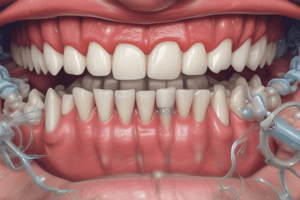Podcast
Questions and Answers
What are the primary causes of dental caries?
What are the primary causes of dental caries?
- Fluoridated water, oral hygiene, and preventive measures
- Dental plaque, host factors, fermentable carbohydrates, micro-organisms, and time (correct)
- Saliva, race, and gender
- Genetics, diet, and age
Which factor is NOT mentioned as affecting the prevalence of caries?
Which factor is NOT mentioned as affecting the prevalence of caries?
- Gender
- Race
- Diet and sugar consumption (correct)
- Familial heredity
What has led to a decrease in caries rate in industrialized countries?
What has led to a decrease in caries rate in industrialized countries?
- Improvement in oral health education
- Trend toward preventive measures such as fluoridated water, dental care, and better oral hygiene (correct)
- Increase in sugar consumption
- Decrease in access to dental care
Which population generally has lesser caries incidence?
Which population generally has lesser caries incidence?
In which age group does the incidence of caries increase again after decreasing somewhat?
In which age group does the incidence of caries increase again after decreasing somewhat?
What is NOT mentioned as a primary cause of dental caries?
What is NOT mentioned as a primary cause of dental caries?
What is the role of dental plaque?
What is the role of dental plaque?
Which factor is considered a contributing factor for the initiation of caries?
Which factor is considered a contributing factor for the initiation of caries?
What forms the acquired pellicle in the process of plaque formation?
What forms the acquired pellicle in the process of plaque formation?
Which type of sugar is considered the most cariogenic?
Which type of sugar is considered the most cariogenic?
How can dental caries be controlled in relation to the 'Host (tooth)' factor?
How can dental caries be controlled in relation to the 'Host (tooth)' factor?
What is hindered by active and passive immunization in relation to dental caries?
What is hindered by active and passive immunization in relation to dental caries?
What is the ideal quantity of saliva for the best washing action of plaque?
What is the ideal quantity of saliva for the best washing action of plaque?
Which component of saliva is described as more beneficial in relation to dental caries?
Which component of saliva is described as more beneficial in relation to dental caries?
Flashcards are hidden until you start studying
Study Notes
Primary Causes of Dental Caries
- The main causes of dental caries include bacteria, frequent sugar intake, poor oral hygiene, and acid production from plaque.
- Factors not mentioned affecting caries prevalence include socioeconomic status and access to dental care.
Decrease in Caries Rates
- Industrialized countries have seen a decline in caries rates due to improved oral hygiene practices, fluoride use, and better access to dental care.
Population Incidence
- Generally, populations with lower sugar consumption and better oral health education experience lesser incidence of caries.
Age Group Trends
- The incidence of caries increases again in older adults after a decline observed in younger populations.
Non-primary Causes
- Factors such as genetic predisposition or dietary composition are not considered primary causes of dental caries.
Role of Dental Plaque
- Dental plaque plays a critical role in caries onset as it harbors bacteria that produce acids damaging tooth enamel.
Contributing Factors
- Frequent intake of fermentable carbohydrates (sugars) is a significant contributing factor for the initiation of caries.
Acquired Pellicle Formation
- The acquired pellicle forms through the deposition of proteins from saliva onto the tooth surface, aiding plaque formation.
Cariogenic Sugars
- Sucrose is regarded as the most cariogenic type of sugar, promoting rapid caries development.
Controlling Caries - Host Factor
- To control dental caries related to the host factor (tooth), maintaining good oral hygiene and regular dental check-ups are essential.
Immunization Impact
- Active and passive immunization can hinder the establishment and growth of cariogenic bacteria in dental caries.
Ideal Saliva Quantity
- An ideal quantity of saliva provides sufficient washing action to help remove plaque and food particles, aiding in caries prevention.
Saliva Components
- Components such as fluoride and calcium present in saliva are particularly beneficial in preventing dental caries.
Studying That Suits You
Use AI to generate personalized quizzes and flashcards to suit your learning preferences.




